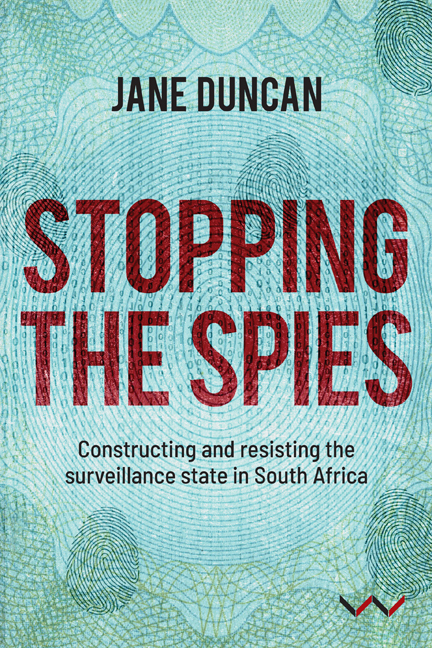Book contents
- Frontmatter
- Contents
- Acknowledgements
- List of Figures and Tables
- List of Acronyms
- Preface
- Introduction
- Chapter 1 Theorising the surveillance state
- Chapter 2 Is privacy dead? Resistance to surveillance after the Snowden disclosures
- Chapter 3 The context of surveillance and social control in South Africa
- Chapter 4 Lawful interception in South Africa
- Chapter 5 State mass surveillance, tactical surveillance and hacking in South Africa
- Chapter 6 Privacy, surveillance and public spaces in South Africa
- Chapter 7 Privacy, surveillance and population management: the turn to biometrics
- Chapter 8 Stopping the spies: resisting unaccountable surveillance in South Africa
- Chapter 9 Conclusion
- Notes
- Select Bibliography
- Index
Chapter 6 - Privacy, surveillance and public spaces in South Africa
Published online by Cambridge University Press: 17 May 2019
- Frontmatter
- Contents
- Acknowledgements
- List of Figures and Tables
- List of Acronyms
- Preface
- Introduction
- Chapter 1 Theorising the surveillance state
- Chapter 2 Is privacy dead? Resistance to surveillance after the Snowden disclosures
- Chapter 3 The context of surveillance and social control in South Africa
- Chapter 4 Lawful interception in South Africa
- Chapter 5 State mass surveillance, tactical surveillance and hacking in South Africa
- Chapter 6 Privacy, surveillance and public spaces in South Africa
- Chapter 7 Privacy, surveillance and population management: the turn to biometrics
- Chapter 8 Stopping the spies: resisting unaccountable surveillance in South Africa
- Chapter 9 Conclusion
- Notes
- Select Bibliography
- Index
Summary
Communications networks are not the only sites of data-driven surveillance; increasingly, public spaces are being placed under surveillance, too. This chapter assesses the extent to which this is the case in South Africa by looking at the growth in the use of CCTV cameras, drones and other forms of locational tracking for surveillance purposes. Before the advent of computers, street-level surveillance was mainly physical; people would be followed and suspicious vehicles or individuals would be stopped in roadblocks. More recently, computerisation has greatly enhanced the ability of the authorities to track people in public spaces. Unlike the kinds of communications surveillance that Snowden exposed, CCTV cameras represent more visible forms of surveillance. Although, theoretically, this makes it more likely that publics will debate the pros and cons of such technologies, public debate has largely been muted, with most of the critical debates taking place in academia and rarely finding their way into popular discourse.
Increasingly, these street-level (or, in the case of drones, above street-level) forms of surveillance are going ‘smart’: that is, they are incorporating features that allow them to collect and transmit data for further analysis by computers, thereby becoming powerful policing tools. This information can allow law enforcement or intelligence agencies to identify individuals and track their movements. In some cases, locational tracking systems set up for commercial or public safety purposes – such as to monitor traffic flow or to bill people for premium road usage – may begin to be used for policing purposes as well: a form of function creep that can raise serious data protection concerns. This chapter explores the extent to which these challenging issues are emerging in South Africa, by examining the concept of locational privacy and its relevance to three street-level or public surveillance projects: CCTV roll-out in major cities, surveillance and automated e-tolling, and emerging regulations around drone usage in public.
CCTV, STREET-LEVEL SURVEILLANCE AND LOCATIONAL PRIVACY IN SOUTH AFRICA
Locational privacy refers to the right of people to move about freely, without having their movements tracked. A person's movements constitute personal information, which he or she has a right to exercise control over. This right is becoming increasingly important, as information about people's movements can reveal a great deal about their personal, social and political activities.
- Type
- Chapter
- Information
- Stopping the SpiesConstructing and resisting the surveillance state in South Africa, pp. 141 - 164Publisher: Wits University PressPrint publication year: 2018



